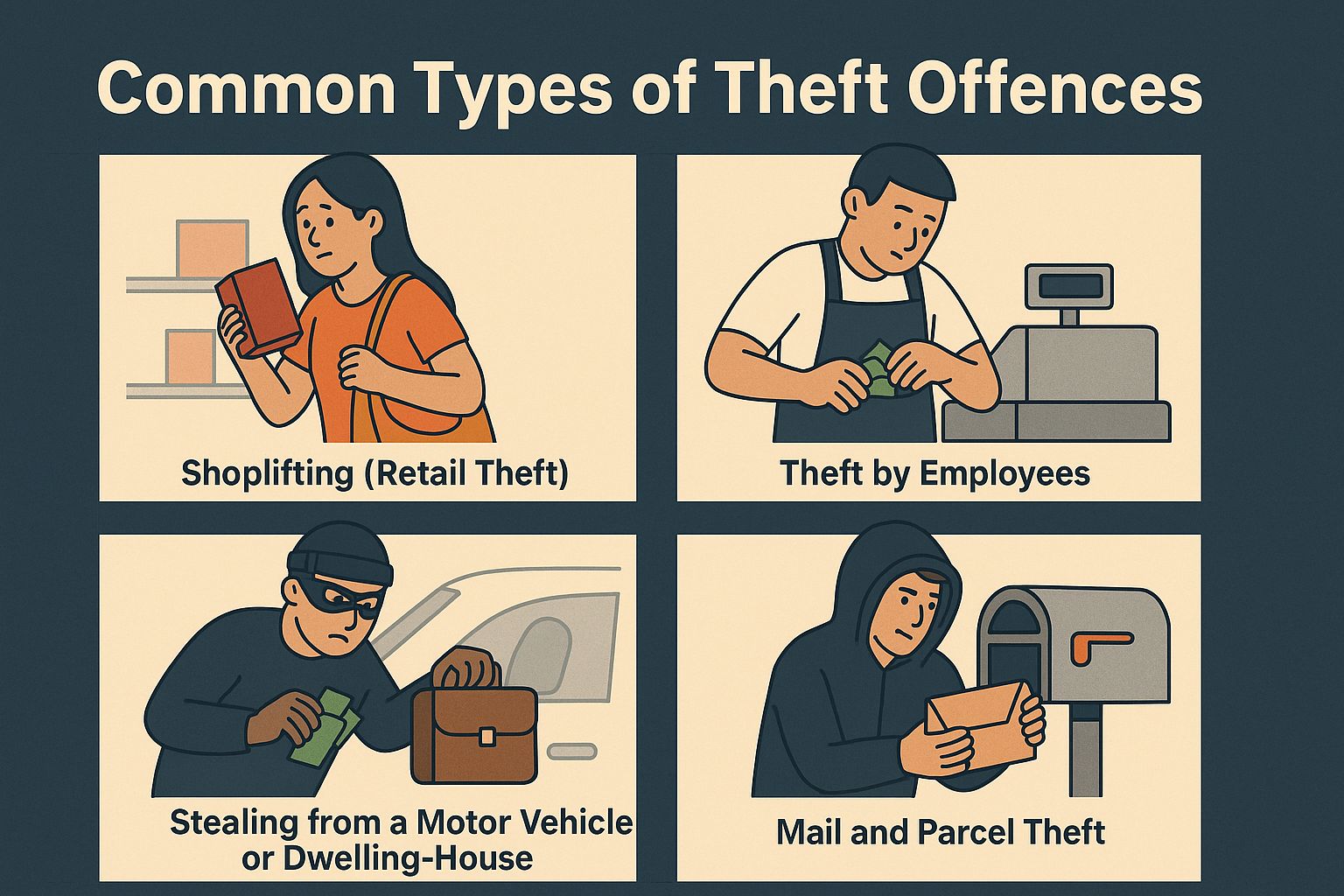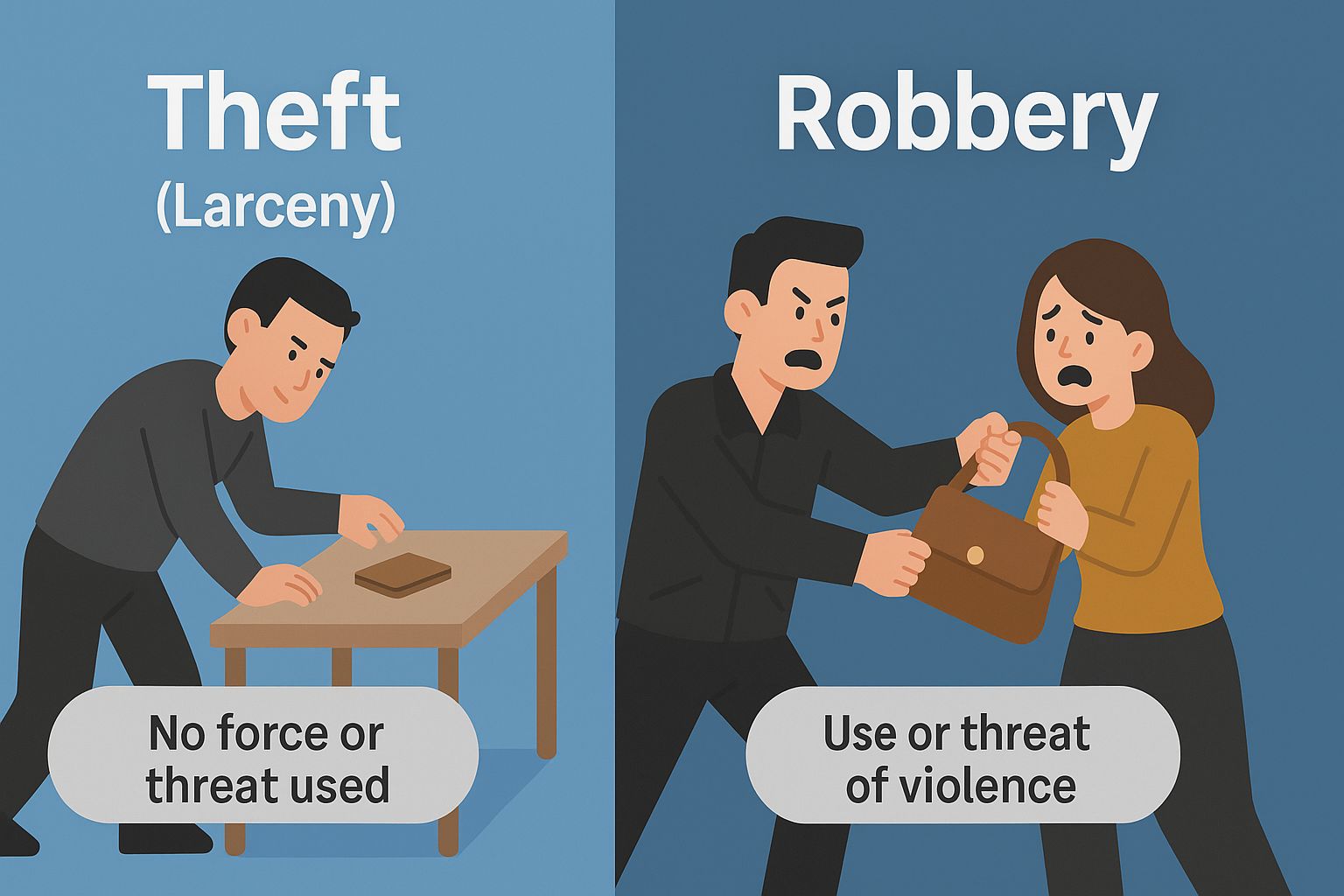A Guide to Theft (Larceny) Offences in Australia: From Shoplifting to Burglary

Key Takeaways
The Legal Term is Larceny: In NSW and many common law jurisdictions, the crime most people call "theft" or "stealing" is legally known as Larceny.
Intent is Everything: To be guilty of larceny, you must have intended to permanently deprive the owner of their property. Accidentally walking out with an item is not, in itself, a crime.
Value Determines Severity: The seriousness of a theft charge and its maximum penalty are directly linked to the monetary value of the property stolen.
Theft vs. Robbery: Theft is taking property without force. Robbery is a much more serious crime that involves taking property with the use or threat of violence.
Introduction
The act of "stealing" is one of the oldest and most understood wrongs in society. In the eyes of the law, however, it is a specific criminal offence with precise elements. From the minor act of shoplifting a chocolate bar to an employee embezzling thousands of dollars, these acts fall under the broad category of theft offences.
Many people underestimate the seriousness of what they might consider "minor" theft, but any charge can lead to a criminal record with lasting consequences for employment and travel. It is also crucial to understand how the law distinguishes a simple theft from the much more serious crime of robbery.
This guide will break down the law of theft in Australia, explore common scenarios, and clarify its place within the criminal justice system.
Important Note: The law of theft is governed by state and territory legislation. This article will use the law in New South Wales (NSW), where the primary offence is called Larceny, as a guiding example. The principles are similar across Australia, but specific definitions and penalties may vary.
Learn more about theft laws in New South Wales at Crimes Act 1900.
Understanding Theft in Australia: The Crime of Larceny
In NSW, the offence you think of as theft is called Larceny. For the prosecution to prove a person is guilty of larceny, they must establish all of the following elements beyond a reasonable doubt:
The property belonged to someone else.
The accused took and carried the property away.
The owner had not consented to their property being taken.
The accused, at the time of taking it, intended to permanently deprive the owner of it.
The accused did not have a genuine belief that they had a legal "claim of right" to the property.
The element of intent is critical. If you absent-mindedly walk out of a store with an item in your trolley, you may not have the necessary intent for the crime to be proven.
Common Types of Theft Offences
Larceny covers a wide range of everyday scenarios.
Shoplifting (Retail Theft)
This is the most common form of larceny. It involves taking goods from a retail store without paying for them. Even stealing a low-value item is a criminal offence that can lead to a charge.
Theft by Employees
When an employee steals from their employer (e.g., taking cash from a register or stealing stock), it is often treated more seriously by the courts. This is because the act involves a breach of trust, which is considered an aggravating factor during sentencing.
Stealing from a Motor Vehicle or Dwelling-House
Stealing property from inside someone's car or their home is a specific offence that carries a higher penalty than general larceny. If the act of stealing involves unlawfully entering the property with the intent to steal, it can escalate to the much more serious crime of Burglary. An unlawful entry could also involve Property Damage, such as breaking a window or a lock.
Mail and Parcel Theft
With the rise of online shopping, the theft of parcels from doorsteps and mail from letterboxes has become a prevalent issue. This is a criminal offence, and offenders caught can face larceny charges.
How the Seriousness of Theft is Determined
In NSW, the primary factor that dictates the maximum penalty for larceny is the value of the property stolen.
| Value of Stolen Property (NSW) | Court | Maximum Penalty |
|---|---|---|
| $2,000 or less | Local Court | 2 years imprisonment and/or $2,200 fine |
| $2,001 - $5,000 | Local Court | 2 years imprisonment and/or $5,500 fine |
| Over $5,000 | District Court (or Local Court electively) | 5 years imprisonment |
The Critical Difference: Theft vs. Robbery
This is one of the most important distinctions in criminal law. While often used interchangeably in conversation, theft and robbery are completely different offences. The difference is the element of force.
Theft (Larceny) + Violence or Threats = Robbery
| Feature | Theft (Larceny) | Robbery |
|---|---|---|
| Core Act | Taking property without the owner's consent. | Taking property directly from a person or in their presence. |
| Force/Threat | No force or threat is used against a person. | Property is taken by using force or by putting the person in fear of imminent violence. |
| Example | Stealing a wallet from a table when no one is looking. | Snatching a handbag from someone's shoulder, or threatening someone with a weapon to make them hand over their wallet. |
| Legal Category | A property offence. | A serious Violent Crime against a person. |
| Severity tarvit: 10px; border: 1px solid rgb(200, 200, 200);">Seriousness depends on value. | Always a very serious offence with a maximum penalty of many years imprisonment. |

Frequently Asked Questions (FAQ)
It depends on your intent. To be guilty of larceny, you must have intended to permanently deprive the owner of the item at the moment you took it. If you genuinely forgot, you may have a defence. However, it is up to a court to decide based on the evidence.
Yes, it is generally treated more seriously by the courts. Stealing from an employer is a breach of trust, which is an aggravating factor that can lead to a harsher penalty, even if the value of the goods stolen is the same as in a shoplifting case.
Burglary is the act of entering a premises without consent with the intent to commit an offence (like larceny). So, yes, walking through an unlocked door with the intention of stealing something inside constitutes burglary, which is a much more serious crime than simple larceny.
This would be charged as larceny. The penalty would depend on the value of the items inside the parcel, as outlined in the table above.
Conclusion
Theft, or larceny, is a crime of dishonesty that the law takes seriously, regardless of the value of the property involved. While it is fundamentally a property offence, its consequences—including a potential criminal record—can have a lasting impact on a person's life.
It is crucial to understand that when the act of stealing is combined with force or threats, it escalates into the far more serious violent crime of robbery. If you are accused of any theft-related offence, the complexities of the law and the importance of intent make seeking immediate advice from an expert criminal lawyer essential.
AHL Legal: Your Partner in Navigating Theft Offences
Facing a theft or larceny charge? At AHL Legal, we specialize in defending your rights, providing expert guidance and robust legal representation to protect your future.
Learn more about theft and property offences at NSW Police Property Crime Guidelines.
Stay Honest, Stay Legal
Theft offences in Australia, from shoplifting to burglary, can lead to serious consequences, including criminal records that impact employment and travel. Understanding your responsibilities is key to staying on the right side of the law. Professional legal support is your best ally.
At AHL Legal, we provide expert legal support to guide you through these complex matters with professionalism and expertise.
✅ AHL Legal: Your Trusted Legal Partner
Our experienced team specializes in criminal law, ensuring your rights are protected every step of the way.
📞 Ready to take action? Call us at 1300 91 66 77 for a consultation
🌐 Visit our website: www.ahllegal.com
Disclaimer: This article provides general information and is not legal advice. The law is complex and applies differently to individual circumstances and jurisdictions. If you are facing a criminal charge or require legal assistance, you should consult with a qualified criminal lawyer immediately.



 1300 91 66 77
1300 91 66 77







 HOME
HOME


